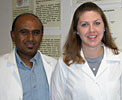Ganado native begins training beyond her doctorate in cancer research at UHV
The University of Houston-Victoria’s first postdoctoral fellow is working with a UHV professor and a Houston oncologist to conduct research that eventually could make chemotherapy and radiation more effective in cancer patients.
 |
| Madonna Mamerow, the University of Houston-Victoria’s first postdoctoral fellow, stands outside the UHV biology lab with her mentor, biology faculty member Richard Gunasekera |
Madonna Mamerow, who received her doctorate in nutritional biochemistry in May from the University of Texas at Austin, started her fellowship at UHV earlier this month. Mamerow is under the mentorship of UHV biology faculty member Richard Gunasekera for her postdoctoral program.
“Dr. Mamerow’s training is important for UHV because it will show people that we are a serious player in the research world even though we don’t have a doctoral program yet,” Gunasekera said. “It also is important for Dr. Mamerow because it will give her the ultimate qualification she needs to conduct research and teach at the university level in the hard sciences.”
Gunasekera and Peter Anderson, an oncologist and professor at the University of Texas M.D. Anderson Cancer Center in Houston, developed the project. The research will be funded by $75,000 received by Gunasekera from the UT System’s Texas Ignition Fund. The research will be conducted at UHV and clinicals at M.D. Anderson.
The collaborative project is important for cancer patients because some of them eventually develop a resistance to chemotherapy. Without intervention, these patients die, Gunasekera said.
The research will develop an instant “nano” test using a tiny drop of blood taken from a cancer patient. The test results will allow doctors to better know which chemotherapy drugs to use on a patient and which nutritional supplements to give them so that they hopefully won’t develop a chemotherapy resistance.
“I think this research will be extremely valuable for both physicians and cancer patients,” Mamerow said. “It’s a diverse postdoctoral fellowship in the sense that it’s giving me training to eventually perform either academic or industry research.”
Mamerow grew up in Ganado and did some of her early studies at The Victoria College. She received her bachelor’s degree in health science studies in 2000 from Baylor University in Waco and her master’s degree in clinical gerontology in 2001 from the university. She also spent the spring semester of 1999 studying abnormal psychology and organic chemistry at Oxford University in England.
The purpose of a postdoctoral fellowship is to help with the transition from student to independent scholar, Gunasekera said.
“We do all of our cancer research at UHV as a team of scientists that includes my colleague, Dr. Siva Somasundaram, our lab technicians and especially our students,” he said. “These students are trained and exposed to cutting-edge biochemical and nanotechnology during their time here.”
Mamerow will work to get her research published while she is at UHV, and she plans to present her findings at national cancer organization meetings.
“I am pleased with the research progress in our science, technology and mathematics division,” said Jeffrey Di Leo, dean of the UHV School of Arts & Sciences. “I’m looking forward to many more exciting things to come.”
The University of Houston-Victoria, located in the heart of the Coastal Bend region since 1973 in Victoria, Texas, offers courses leading to more than 80 academic programs in the schools of Arts & Sciences; Business Administration; and Education, Health Professions & Human Development. UHV provides face-to-face classes at its Victoria campus, as well as an instructional site in Katy, Texas, and online classes that students can take from anywhere. UHV supports the American Association of State Colleges and Universities Opportunities for All initiative to increase awareness about state colleges and universities and the important role they have in providing a high-quality and accessible education to an increasingly diverse student population, as well as contributing to regional and state economic development.
Paula Cobler
361-570-4350




